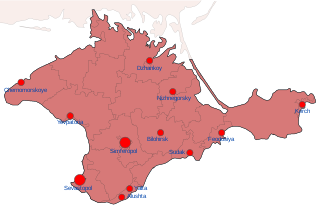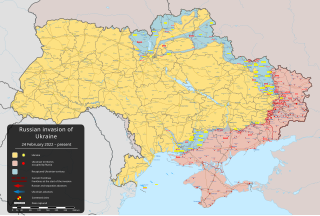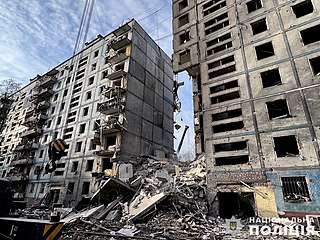
The Black Sea Fleet is the fleet of the Russian Navy in the Black Sea, the Sea of Azov and the Mediterranean Sea. The Black Sea Fleet, along with other Russian ground and air forces on the Crimean Peninsula, are subordinate to the Southern Military District of the Russian Armed Forces. The fleet traces its history to its founding by Prince Potemkin on 13 May 1783 as part of the Imperial Russian Navy. The Russian SFSR inherited the fleet in 1918; with the founding of the Soviet Union in 1922, it became part of the Soviet Navy. Following the collapse of the Soviet Union in 1991, the Black Sea Fleet was partitioned between the Russian Federation and Ukraine in 1997, with Russia receiving title to 82% of the vessels.

The Crimean Bridge, also called Kerch Strait Bridge or Kerch Bridge, is a pair of parallel bridges, one for a four-lane road and one for a double-track railway, spanning the Kerch Strait between the Taman Peninsula of Krasnodar Krai in Russia and the Kerch Peninsula of Crimea. Built by the Russian Federation after its annexation of Crimea at the start of 2014, the bridge cost ₽227.92 billion (US$3.7 billion) and has a length of 19 km (12 mi), making it the longest bridge in Europe and the longest bridge ever constructed by Russia.

There have been attacks in mainland Russia as a result of the Russian invasion of Ukraine, which began on 24 February 2022. The main targets have been the military, the arms industry and the oil industry. Many of the attacks have been drone strikes, firebombing, and rail sabotage. The Ukrainian intelligence services have acknowledged carrying out some of these attacks. Others have been carried out by anti-war activists in Russia. There have also been cross-border shelling, missile strikes, and covert raids from Ukraine, mainly in Belgorod, Kursk, and Bryansk oblasts. Several times, Ukrainian-based paramilitaries launched incursions into Russia, captured border villages and battled the Russian military. These were carried out by units made up mainly of Russian emigrants. While Ukraine supported these ground incursions, it denied direct involvement.

Novocherkassk (BDK-46) was a Ropucha-class landing ship of the Russian Navy and part of the Black Sea Fleet. Named after Russian city of Novocherkassk, the ship was built in Poland and launched in 1987.
This timeline of the Russian invasion of Ukraine covers the period from 29 August 2022, when Ukraine's Kherson counteroffensive started, to 11 November 2022 when Ukrainian troops retook Kherson. In between, Ukraine launched a successful counteroffensive in Kharkiv Oblast. Starting in October, Russia began a campaign of massive strikes against Ukrainian infrastructure.

On 27 February 2014, unmarked Russian soldiers were deployed to the Crimean Peninsula in order to wrest control of it from Ukraine, starting the Russo-Ukrainian War. This military occupation, which the Ukrainian government considers to have begun on 20 February, laid the foundation for the Russian annexation of Crimea on 18 March 2014. Under Russia, the Ukrainian Autonomous Republic of Crimea was replaced by the Republic of Crimea, though the legitimacy of the latter is scarcely recognized internationally.

2022 Crimean Bridge explosion was an event during the Russian invasion of Ukraine, on 8 October 2022, at 6:07 a.m., when a fire broke out on the Crimean Bridge as a result of an explosion of a bomb loaded onto a truck, which occurred on the road bridge, on the westbound vehicle lanes running from Russia to Kerch in Russian-occupied Crimea. Two two-lane vehicular spans of the bridge collapsed into the water. Two adjacent eastbound lanes on a separate structure survived. The railway bridge was also damaged by a railway tanker car that caught fire. Five people were killed. Following the incident, the Investigative Committee of Russia launched an investigation.

Beginning in July 2022, a series of explosions and fires occurred on the Russian-occupied Crimean Peninsula, from where the Russian Army had launched its offensive on Southern Ukraine during the Russian invasion of Ukraine. Occupied since 2014, Crimea was a base for the subsequent Russian occupation of Kherson Oblast and Russian occupation of Zaporizhzhia Oblast.

The Zaporizhzhia residential building airstrike occurred in the early morning of 9 October 2022. The missile attack by the Russian Armed Forces, killed at least 13 people and injured more than 89 others.

Russia launched waves of missile and drone strikes against energy in Ukraine as part of its invasion. From 2022 the strikes targeted civilian areas beyond the battlefield, particularly critical power infrastructure, which is considered a war crime. By mid-2024 the country only had a third of pre-war electricity generating capacity, and some gas distribution and district heating had been hit.

During the Russian invasion of Ukraine, aerial warfare took place as early as the dawn of 24 February 2022, with Russian infantry and armored divisions entering into Eastern Ukraine with air support. Dozens of missile attacks were reported across Ukraine. The main infantry and tank attacks were launched in four spearhead incursions, creating a northern front launched towards Kyiv, a southern front originating in Crimea, a south-eastern front launched at the cities of Luhansk and Donbas, and an eastern front. Dozens of missile strikes across Ukraine also reached as far west as Lviv. Drones have also been a critical part of the invasion, particularly in regards to combined arms warfare. Drones have additionally been employed by Russia in striking Ukrainian critical infrastructure, and have been used by Ukraine to strike military infrastructure in Russian territory.
On 29 October 2022, there was a large-scale attack by aerial drones and drone boats on the Black Sea Fleet in Sevastopol during the Russian invasion of Ukraine.
This timeline of the Russian invasion of Ukraine covers the period from 8 June 2023, when the 2023 Ukrainian counteroffensive began, to 31 August 2023.
Bridges have been a strategic and tactical aspect of the Russo-Ukrainian War, particularly since the 2022 Russian invasion of Ukraine. As there are more than 23,000 rivers and over 28,000 bridges in Ukraine, several important events, including battles, blocked advances, political disputes, and the successes and failures of army units, have centered around the country’s bridges. The UK Ministry of Defense has said, "River crossing operations are likely to be amongst the most important determining factors in the course of the war".
MAGURA V5 is a Ukrainian multi-purpose unmanned surface vehicle (USV) developed for use by the Main Directorate of Intelligence of Ukraine (HUR) capable of performing various tasks: surveillance, reconnaissance, patrolling, search and rescue, mine countermeasures, maritime security, and combat missions.

On 22 September 2023, several Ukrainian Storm Shadow/SCALP cruise missiles penetrated Russian air defenses and struck the headquarters of the Black Sea Fleet in occupied Sevastopol, Crimea. The strike was part of the war resulting from the ongoing Russian invasion of Ukraine, and was referred to as Operation Crab Trap by Lieutenant General Kyrylo Budanov, the head of the Main Directorate of Intelligence (HUR).

Naval warfare in the Russian invasion of Ukraine began on 24 February 2022, when the Russian Armed Forces launched a full-scale invasion of Ukraine, in a major escalation of the Russo-Ukrainian War, which began in 2014. Media reporting of and focus on the invasion has largely been on the terrestrial and aerial aspects – however, maritime engagements have been consequential during the conflict. Disputes over Ukrainian grain exports through the Black Sea have also played a significant role.
This timeline of the Russian invasion of Ukraine covers the period from 1 September to 30 November 2023 during the 2023 Ukrainian counteroffensive.

Sea Baby is a Ukrainian multi-purpose unmanned surface vehicle (USV) developed for use by the Security Service of Ukraine (SBU) during the Russian invasion of Ukraine. It is able to carry an explosive payload for use in kamikaze attacks, or equipped with other equipment loadouts for more specialised use.














